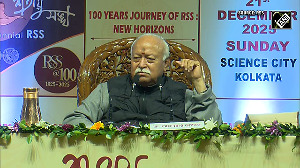The group of ministers on telecom on Thursday paved the way for a unified licencing regime, a major beneficiary of which would be Reliance whose limited mobile services had triggered a conflict between the cellular and basic operators.
The recommendation of the GoM for combining the licences of basic and cellular operators as also levy of additional fee for WLL services as directed by the Telecom Dispute Settlement and Appellate Tribunal would be considered by the Union Cabinet on Friday for a final decision.
"The GoM has accepted the recommendations of Telecom Regulatory Authority of India on unified Licence and fee to be charged for WLL operators in toto. A Cabinet note in this regard shall be prepared tonight to be placed before the Cabinet tomorrow," Communications and IT Minister Arun Shourie told reporters after the final meeting of the GoM in New Delhi.
With the decision, Reliance Infocomm would be required to pay about Rs 1,581 crore (Rs 15.81 billion) for migrating to a unified regime which includes Rs 1,096 crore (Rs 10.96 billion) towards migration fee and Rs 485 crore (Rs 4.85 billion) as penalty as recommended by Trai for offering cellular type fully mobile services, the minister said.
After unification, requirement of additional spectrum for new services would be done on payment as per the guidelines from Trai, he said.
Shourie also said the government had filed a caveat in various high courts apprehending a possible move for a stay by the cellular operators.
Cellular operators have already moved the Supreme Court challenging TDSAT's order, which had permitted WLL service to the basic operators.
As per Trai's recommendations, accepted by the group of minister's, WLL operators wanting to migrate to the unified regime would be required to pay the difference of the entry fee for the fourth cellular operator and the entry fee already paid by them.
Shourie also informed that the finance ministry would be addressing the problems of cellular operators with regard to their meeting the obligations towards financial institutions.
He, however, declined to give details about the issue, but said there was "no case for any compensation to the cellular operators in lieu of unification of basic and cellular
licences."
GoM's earlier recommendations on increasing foreign direct investment in the telecom sector to 74 per cent could face some resistance as one of the intelligence agencies had raised some concerns over the move, Shourie said, adding, "We shall report the existing position and the consequences as pointed out by intelligence agencies to the Cabinet."
Shourie said the group had also attached importance to proper use of spectrum, which was a scarce resource and that Trai has been requested to formulate a scheme incorporating incentives for efficient use of spectrum and strong disincentives for inefficient use.
The existing operators must continue to provide limited services also for those subscribers who so desire.
Shourie said with respect to rural telephony, the proposal to activate the USO fund is finalised and will be submitted to the cabinet tomorrow, and the first step of this would be amendment of the Indian Telegraph Act.





